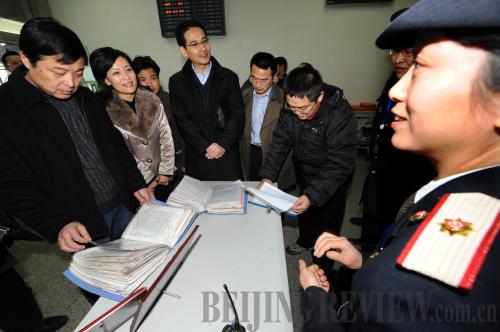|
 |
|
SUPERVISORY ROLE: Members of local committees of the Chinese People's Political Consultative Conference join lawmakers and media workers to inspect work of a railway station in Nanjing, Jiangsu Province, before the Chinese lunar New Year (SUN CAN) |
Short-Lived Building
On February 6, a four-star hotel in Nanchang, capital of central China's Jiangxi Province, was demolished. The 22-story edifice was blown up allegedly because it was too shabby to conform to the city's development planning. A 25-story five-star hotel is set to stand on the same site.
To build or demolish a building is technologically simple nowadays. But the demolished hotel in Nanchang was only built 13 years ago. In general, the life expectancy of these buildings should be at least 50 years. The demolition was not only a waste of money, but also caused serious air and environmental pollution.
The fundamental reason for the building's short life span was that some government departments were too arbitrary and shortsighted in making the decision. If there had been careful studies of the possibility of refurbishing the building, instead of simply pulling it down, such a huge waste could have been avoided. It's important to realize the development of a city should be based on farsighted and scientific planning, open discussion and democratic decision-making procedures.
Western Business News
Another Loophole
Before this year's lunar New Year holiday, hotel rates soared in Sanya, a tropical vacation destination in China's southernmost Hainan Province. But instead of scaring tourists away, hotels were fully booked. The hotels said most of their guests were officials from north China. Since the regulations to restrict government officials' overseas travel have been issued, they have turned to domestic tourism paradises.
The travel restrictions only stop officials from traveling overseas, but the abuse of public funds is still not being effectively inhibited. The packed hotels in Sanya are just examples of freeloading at the expense of the public.
While going abroad is restricted now, officials' domestic trips are growing in number. Compared to overseas trvelling, domestic travel is more easily concealed. And, sometimes, officials from one place may have close connections with scenic sites' local officials and they invite each other for visits at the government's expense.
There are two ways that will effectively prevent the abuse of public funds: transparency and punishment. Transparency means the public's right to know about the fiscal budget and how taxpayers' money is spent. Punishment means penalizing officials for their abuse of public funds.
China Youth Daily
Supply and Demand Gap
There are serious shortages of migrant workers in economically developed southeastern provinces. Take Dongguan in Guangdong Province for example. Despite its efforts to cooperate with sources of migrant workers such as Hunan, Guangxi and Jiangxi, on average there were still two posts for every one worker last December.
Employers need skilled workers with at least junior middle school education, but most available workers cannot meet the requirement.
While businesses worry, migrant workers find themselves helpless and are leaving.
There is no well-developed training mechanism or social security system for migrant workers yet. Most businesses are reluctant to invest in employees' training. Even if it is provided, how can one expect workers to take classes after exhausting work? As a result, businesses cannot find enough qualified employees and migrant workers cannot become employed.
It's good news the state has ordered the raising of the minimum wage for migrant workers, but more important is the provision of a helpful vocational training mechanism, so workers can find decent jobs wherever they go.
People's Daily
Non-Saleable Right
Yu Qingan, a member of the Guangdong Provincial Committee of the Chinese People's Political Consultative Conference (CPPCC), said recently that business people should not be allowed to purchase membership in the political advisory body.
He warned that if the CPPCC membership could be bought, people would lose confidence in it. "Buying a seat in the CPPCC is not the fault of business people, but of the officials involved in the recommendation process," Yu said.
The CPPCC is an important part of the Chinese political system, and it's good for business people to play a role in it. Some business people are among the elite in their profession and of great social influence, but they have little interest in politics. A good recommendation process is therefore vital to the system. It should not be affected by asset size, and under-the-table deals will harm the integrity of the process.
Measures should be taken to make the CPPCC a more effective political group for outstanding representatives of all walks of life to participate in state affairs.
The CPPCC should not become a club for the rich.
Beijing Times | 